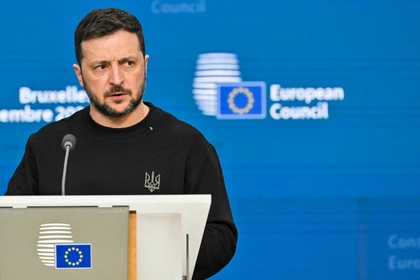Between Thursday and Sunday roughly 350 million voters will elect the 720 members of a new European Parliament. The far-right groups ID (Identity and Democracy) and ECR (European Conservatives and Reformists) are expected to make strong gains. Commentators look at how this shift should be handled.
In search of the lesser evil
JOIN US ON TELEGRAM
Follow our coverage of the war on the @Kyivpost_official.
It could make sense for EU Commission President Ursula von der Leyen to try to win over Italian Prime Minister Giorgia Meloni, says Expressen:
“The price of isolating Meloni could be that the right-wing groups in the EU Parliament consolidate and radicalise. If instead the European centre puts pragmatism above purism, it might be able to split the moderate right from the radical right. ... This is not Europe's finest hour but a time for choosing the lesser evil. However if European politics falters because of too many red lines and ideological barriers, we know who is likely to win: the parties of discontent.”
Von der Leyen is playing with fire
Jutarnji list comments:
“To boost her chances and reduce her dependence on the left, von der Leyen and her political group are flirting with the far right because they are very aware that these parties are growing. Von der Leyen has deliberately not ruled out the possibility of cooperation with these parties because she needs the right number of supporters, not only in the Parliament but also in the Council. But if she gains additional potential votes in one place by jettisoning her principles, she could lose votes elsewhere. The Socialists and Conservatives, Liberals and Greens won't want to support her if she cooperates with the far right.”

Zelensky Says Trump and EU Must Work Together to Secure Peace
Prevent chaos of changing majorities
In Corriere della Sera, entrepreneur Bernard Spitz hopes the result will be a very large coalition:
“We will need a strong Commission and a Parliament united around a majority. Otherwise the smallest sensitive issue in a single country could paralyse everything. ... If a clear line is to emerge, rather than a confusion of majorities that change depending on the issue at hand under pressure from the far right, a broad coalition will be needed. This will invariably require compromises between participants. On the one hand the chaos-causing extremists must be excluded; on the other, preparations must be made for collaboration. ... Stretching from the Social Democrats to the centre, and from the right wing of the EPP to Giorgia Meloni's group.”
Don't leave voters' concerns to the populists
Berlingske proposes a constructive approach to right-wing parties:
“Perhaps it's not the shift to the right per se that we should fear, but the arrogant and powerless reaction of the centre. Because the dissatisfied voters really do have reason to be dissatisfied, and as long as no one but the far right listens to them, Europe will remain trapped - and that is disastrous in a situation in which the major powers are putting us under pressure in every conceivable way. ... Instead, we should take a constructive approach to the shift to the right. The parties of the far right may not have the right solutions, but they point to the right problems.”
Moscow has already voted
Putin has participated in the elections in his own way, columnist Paulius Jurkevičius affirms in Delfi:
“He has already voted - by secret ballot, he just has to wait for the results. He voted in a special way - from a distance, but he didn't send his ballot paper by post. Vladimir Putin usually votes in euros. And sometimes he wins. ... He forges ties, offers support, and seeks ideological points of contact. Putin wants to see those who fit into the system of seven ideological points in the new EU Parliament. ... Homophobia, anti-vaccine activism, glorification of traditional family values, assertion of 'national interests of small countries' as in the case of Slovakia and Hungary, antisemitism, xenophobia, and a ceasefire in Ukraine.”
You can also highlight the text and press Ctrl + Enter






